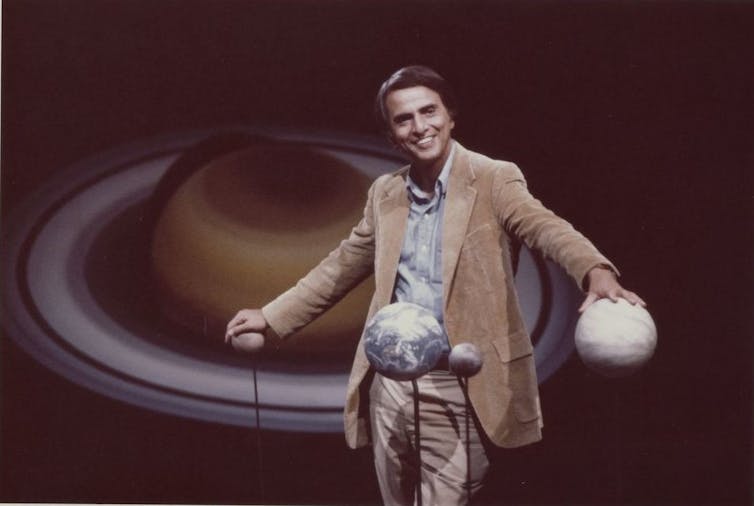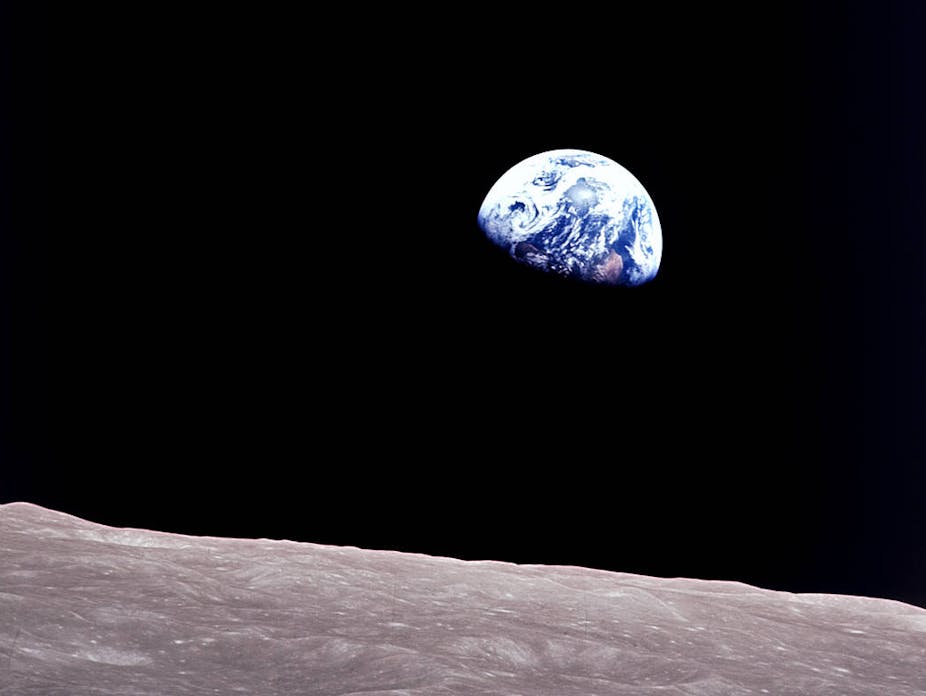It’s now been 50 years since the US won the space race and put two men on the moon for the first time. It was a tremendous technological achievement, rightly celebrated as one of the major feats accomplished by human civilisation.
But the Apollo programme had cultural reverberations that have yet to make their full ideological and political impact.
The programme was originally mired in Cold War nationalism and the direct result of the competition for prestige between the US and the Soviet Union. Yet, arguably its greatest result was that, as the late astronomer and astrophysicist Carl Sagan argued, it “helped awaken our slumbering planetary consciousness”. If Sagan is right, then politicians are yet to take full advantage of a smouldering existential challenge to the politics of nationalism that has dominated the last couple of centuries.
The Apollo missions introduced people to the Earth as seen from space, through iconic photographs taken by the astronauts such as Earthrise, from Apollo 8, or the Blue Marble, from Apollo 17, which shows one side of the entire planet with Africa visible beneath swirling clouds.
For Sagan, these pictures were the true “gift of Apollo”. Many of the astronauts and cosmonauts that got to see this view firsthand, experienced what the author Frank White christened “the overview effect”. White quotes astronaut Rusty Schweickart, part of Apollo 9, who said that seeing the Earth from orbit made him realise that:
What it is you identify with begins to shift. When you go around the Earth in an hour and a half, you begin to recognise that your identity is with that whole thing.
Read more: Seeing Earth from space changes you – and you don't even have to leave the planet
For White, this newfound identification with the planet that Schweickart described could serve “as the foundation of planetary civilisation”. He also observed that this fundamentally new worldview had since been “assimilating itself into global society’s awareness”.
Sagan eloquently condensed a key realisation from this overview effect when he claimed that from now on “we are one planet”. Crucially, for Sagan this grasp of reality was in direct opposition to a world centred around competing nation states.

With nationalists now emboldened, Donald Trump in the White House, and ethnic nationalism still very popular, Sagan’s hopes that strong nationalist sentiments would be on their way out might well seem an optimist’s dream. Still, a recent surge in support for Green parties and environmentalism in general could prove otherwise.
An ideological shift
The birth of environmentalism is often said to coincide with the first Earth Day celebrated on April 22, 1970 – less than a year after the first moon landing. Though environmentalism has earlier roots than this, the first pictures of Earth certainly gave the environmental movement both a boost and an iconic mascot in the Earth itself.
But seeing ourselves as primarily members of a planetary community also has deeper political implications. What gives the planetary perspective on human civilisation provided by the Apollo missions its most potent force is its unique capacity to conceptually invalidate nationalism, the primary ideology of our age.
Nationalism, which grew out of both the Enlightenment and the later Romantic reaction to it, has provided the most durable and foundational framework for understanding the world. The globalisation theorist Manfred Steger argued in 2008 that nationalism provided the central backdrop for all other contemporary ideologies. Every ideology, be it liberalism or Nazism, has had to find a way to function within this broader ideological framework before it can appeal to large groups of people.
But Steger also noted that since a watershed moment in the late 1960s, when the Apollo missions coincided with the rise of the “new Left” and the cultural rebellion of the hippies, the globe itself has begun to work as a new backdrop that today’s relevant ideologies must be constructed up against. This is exactly the point Sagan appears to have understood at an earlier date.

Environmentalism is one new ideology that takes the planet as its primary point of reference. Neoliberalism, which is sometimes referred to as “globalism”, is another recent example. But neither of these are comprehensively planetary – environmentalists care primarily about preserving the natural environment and neoliberals concentrate on the functioning of the world economy.
Their proponents are looking to change aspects of how national politics works, and not to present an existential challenge to nationalism itself. But if a worldview emerged that had a truly planetary frame, it could offer a fundamental challenge to nationalism.
Planetary politics
In conceptual terms, such a planetary worldview would introduce a new logic: instead of the national people you have humanity, instead of the nation’s territory you have the Earth, and instead of the nation-state you have planetary civilisation.
What hugely complicates any such shift is of course that a true planetary politics will require a completely new institutional architecture – where nations no longer take precedent. We would have to figure out new ways, and perhaps prioritise viewpoints held in common by large swathes of humanity.
That there are few signs of any political programme aiming for this type of transition yet is a testament to how firmly rooted nationalism is in our societies. But as Sagan fittingly put it: “You spend even a little time contemplating the Earth from orbit and the most deeply ingrained nationalisms begin to erode.”
For every new mind that grows to share Sagan’s viewpoint, nationalism will continue to erode. As this process slowly moves forward, we can only hope that this new type of planetary ideology can unite humanity on peaceful terms.
However this plays out politically, the Apollo missions were a key driver behind a transition towards a planetary ideology. This latent gift of Apollo might still impact the next 50 years in profound ways.

